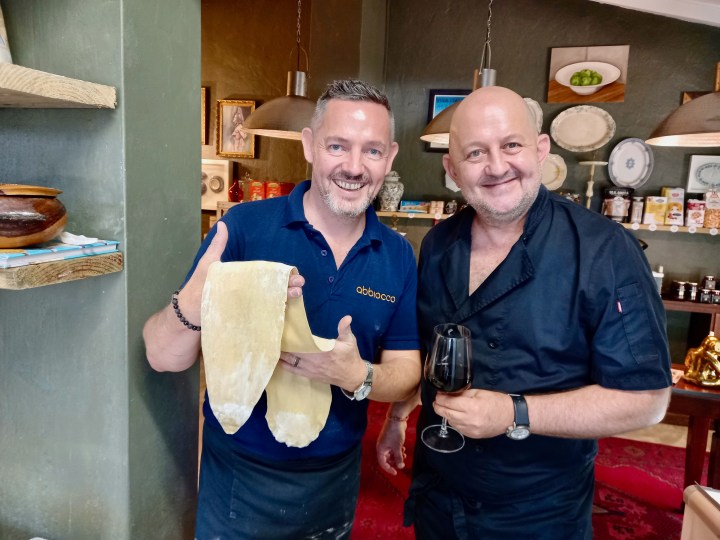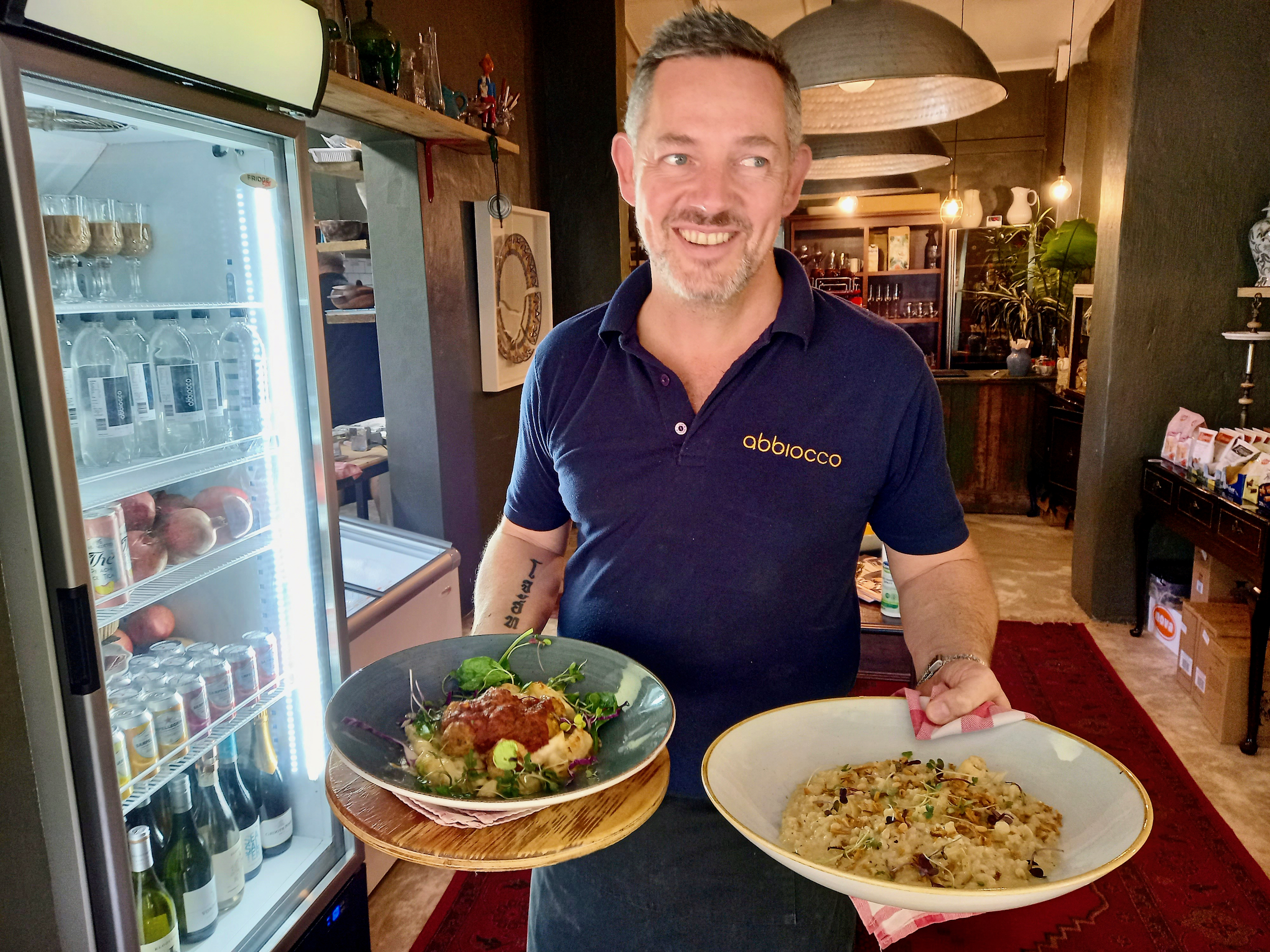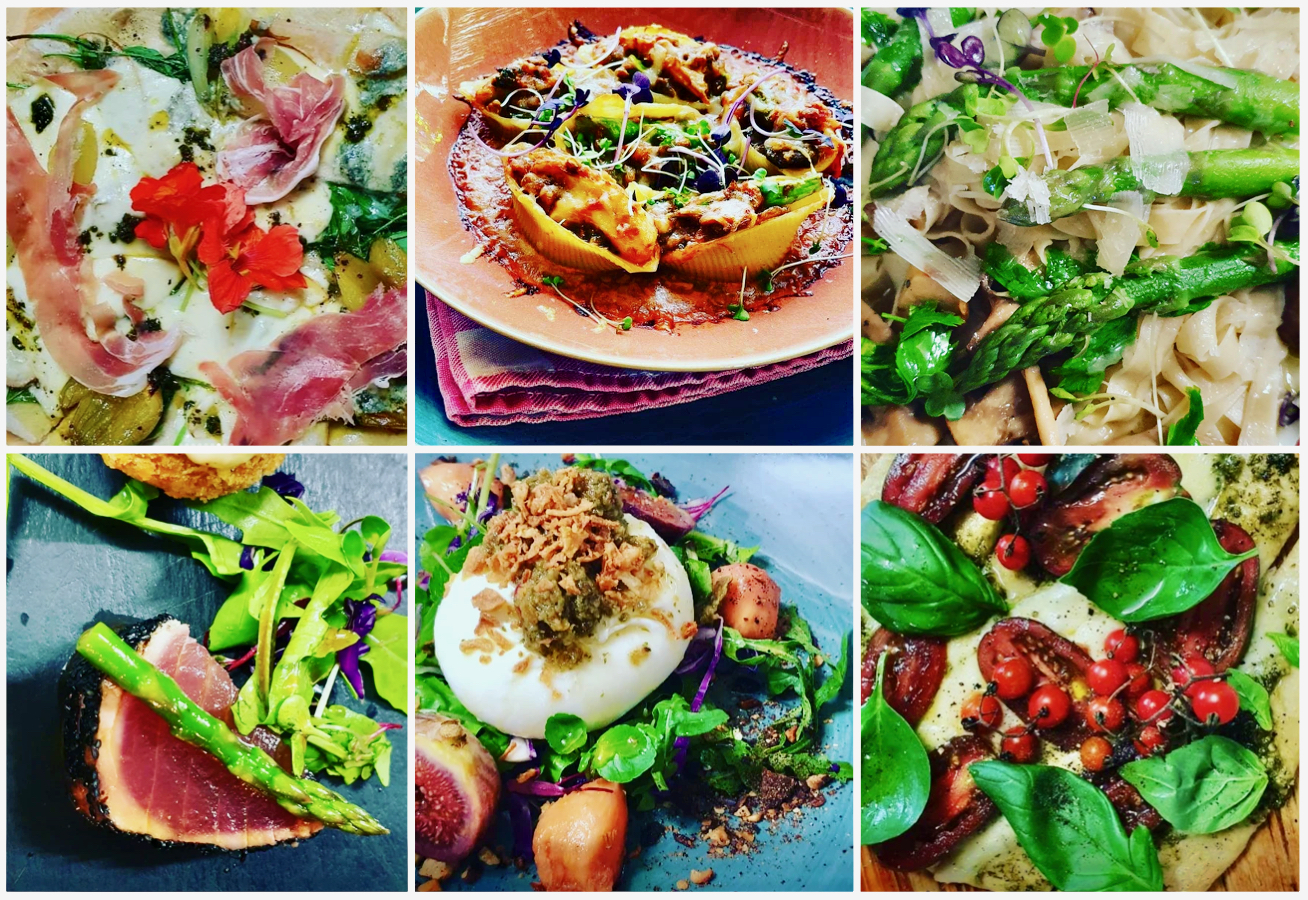ABBIOCCO
Italian flavours the bold in Ballito

Lockdown, riots, floods. More adventure in a year than in 20 years in the Western Cape is how Coenie Kruger and Johan Hurter view their relocation from Riebeek-Kasteel to KZN. Yet when folks ask, ‘are you coming home now?’ they say, ‘We’re home!’
Abbiocco. Only when I sit down to write this piece do I check online for an Italian-to-English translation. Which reveals itself to be: “That drowsy sensation that sneaks up on you after a large meal.” Restated as: “Unlike the kind of sleepiness you experience before going to bed, the abbiocco is an invitation to abandon yourself to a pure state of relaxation, or to shrug off your responsibilities for a brief time before returning to the real world.”
There’s more than a hint of playfulness in the name, which mirrors the lightness of being and humour that blends with the warmth, the banter, the good-natured repartee between Coenie Kruger and Johan Hurter, palpable when in conversation with them at their antipasto bar and deli on Burnedale Farm about 10 minutes north of Ballito.
It’s an ill wind that blows nobody any good or, to put it another way, the Western Cape’s loss was the North Coast of KZN’s gain. “When the whole Covid thing happened, ag, we had to close our restaurant in Riebeek-Kasteel because that town was just a ghost town,” says Hurter.
Together they had opened Mama Cucina 11 years previously.
“That was our third restaurant,” says Kruger. “Our first, in Wynberg in Cape Town, we opened in 2001, called Lupo’s, which in Italian means wolf – it was in Wolfe Street in Chelsea Village. We were there for eight years.”

An Abbiocco antipasto platter. (Photo: Wanda Hennig)
At which point, “we wanted to get out of the city”, says Hurter, explaining their move in 2008 to Riebeek-Kasteel, where “first, we had a small little restaurant. The couple who owned it weren’t up to it anymore and asked us if we don’t want to take it over so we bought it from them. It was called Auntie Pasti and was more like a pub, with one or two meals, but we changed it.”
“Our antipasto platters we’re doing here at Abbiocco are very similar to our Auntie Pasti platters although the menu there was much smaller, like two or three dishes of the day.”
“Then we opened Mama Cucina,” says Kruger. “That was bigger, like a 120-seater restaurant. We had a big pizza oven that we cooked our venison and lamb and everything in overnight so in the mornings when you walked into the restaurant, you had this aroma greeting you with the smell of nice cooked meat.”
“And we were very renowned for our pizzas,” says Hurter.
If you Google, you’ll find all three restaurants still show up online. Each with a “now closed” note.
So why Ballito, right on the other side of the country? Far from the Mediterranean climes of Riebeek-Kasteel, where “there’s figs and pomegranates and grapes and olives and olive oil and good wine”. Across to where there’s sugar cane and humidity and, ah yes, macadamia nuts right on the farm they’ve relocated to way over here in the sub-tropics. And why Italian? Both of their accents and how they express themselves: unmistakably South African.
The Italian first.
“I always loved Italian food and was very fortunate to be trained by Italians,” says Kruger, the chef in the partnership. “I met Enrica Rocca (his erstwhile teacher and mentor) many years ago when she lived in Cape Town and owned a restaurant in Wynberg (called Enrica Rocca) and I am still very good friends with her. She left Cape Town in early 2000 and went back to Venice. Opened a cookery school in London.” [Read about Enrica Rocca and her cooking schools here.]

Johan Hurter delivers baked penne pasta with chicken and chorizo meatballs and a vegetarian risotto dish. (Photo: Wanda Hennig)
Way back, when they met, Kruger and Hurter were both working for restaurants on the Waterfront in Cape Town. Hurter had recently returned from London, having spent five years working at catering companies and restaurants. “I was always front-of-house, although I’m more involved, now we have Abbiocco, in the kitchen as well.”
“Back then, we knew we had to do something together because we would hardly see each other,” says Kruger. Ships passing in the night before they took the plunge and opened Wolf.
Talking about Hurter’s new in-the-kitchen role, Kruger’s eyes twinkle. He laughs. “He’s changed a lot,” he says, eyeing his partner. “He does the desserts now.”
Desserts? “I have a baked lemon cheesecake. That’s standard. Can’t take it off. People just love it. And we make our own ice cream. A peanut butter ice cream. Also one with blackberry, chocolate and orange.
“And then I make a chocolate, peanut butter and coffee panna cotta.”
The fresh pastas are also his baby these days. “With Coenie, it’s more, when the pressure is on in the kitchen, he’s there.” They both laugh. Companionably. Kitchen team. All-the-time team.
Before they left Riebeek-Kasteel, they considered the Western Cape. Coastal towns like Paternoster, where they’d never lived. “But nothing grabbed us.” Hurter’s dad has holiday property in Ballito. “And we actually had just visited him,” says Kruger.
“And here the sea is warm and you can swim. We both love the climate here. We love the humidity, the beach,” says Hurter.
“It’s a different lifestyle,” says Kruger. “And I think you can stay in one place for too long, so then you don’t realise what else is out there, even in your own country. Sometimes it’s good to just go somewhere else. I look at what we’ve created here. And we’re loving it.”
And, he adds, “The people are amazing. So very welcoming. When we started, even other restaurateurs would come and say, listen, do you guys need suppliers’ numbers? Anything? Coming here, being outsiders or incomers, we didn’t know if people would appreciate what we do. Or expect we’d have such a big following in a short time. That amazed us a lot.”
“It’s a lot of word-of-mouth here,” chimes Hurter. “When we opened and for about two weeks it was very quiet but from there, I must say we were flying… And it’s also social media. It’s incredible how people just put something on a WhatsApp group or Instagram and it just exploded, very quickly.”

Looking out from the deli area to the porch where lunch is served. (Photo: Wanda Hennig)
I spend the best part of two mornings at Abbiocco. The first, over a lunchtime. Peering through the French doors across the wooden working table that straddles the entrance, sectioning off the kitchen from one side of the outdoor dining area. Watching the tight ship that is the kitchen crew, the atmosphere relaxed, efficient, focused. Lots going into the industrial oven. Aromas drifting out. The lamb, the garlic, the juices. Sometimes Kruger cooking then plating. Sometimes Kruger and Hurter plating together. Kruger looking happy, relaxed. Smiling often. Like he’s in his element, being creative, loving what he’s doing.
There’s attention to detail everywhere. The sunflowers on the red and white checked tablecloths. The green creepers spilling from the bamboo that extends to the rafters. Shrubs in their pots. The dappled sunlight kissing the many shades of green. The sub-tropical vibe of the KZN North Coast. The dangling dusty grappa bottle, the rusty enamel sieve, the empty champagne bottle, these strung from the wooden rafter beams, along with worn hanging wicker baskets. All the items outside and on the walls inside the deli area speak of chapters from times past, memories not to be forgotten.
Where is the chicken that should be running around? I find myself transported to a time long ago when after hitch-hiking through the Alps from Austria to Italy with my then-teenage daughter, we were dropped by, who knows who? Who knows exactly where? Other than that we were picked up by folks in an open-topped car, who then let us out at a country Italian restaurant with checked tablecloths and scratching chickens near Lake Como. The memory surfaces as I sit amidst this little scene of relaxed, chatting diners in this off-the-beaten-track setting near the village of Umhlali.
The next morning I am at Abbiocco while the staff wipe down the clean tables before laying them with fresh red and white checked cloths, laundered white napkins, cutlery, wine glasses and side plates. Setting the sunflowers in their vases on the tables. I watch the arancini prawn balls being rolled. The glistening plump whitebait dipped into beaten egg, then into flour, then into egg again, then into tempura, then layered in waiting in a Tupperware.
This time the scene evoked is a couple of days after our rural Italy-with-chicken adventure, having taken a ferry down Lake Como, then a train on to Venice where we arrived at around 4am. Instead of finding accommodation, we stashed our packs in the train station and wandered the city with its canals from the pre-dawn when there were just stray cats and us, watching the alleyways awaken, people slowly spill out. Shops and cafes opening as the dawn transformed into the busy-ness of the day.
There’s something special, pleasantly voyeuristic, about being an observer when things are awakening, starting, setting up.

Picture-perfect lunchtime scene with tasters of frittata di patata al fungi, prawn arancini and caprese salad. (Photo: Wanda Hennig)
“For us, moving here was quite a challenge. Cooking Italian food in a tropical climate. Putting our stamp on things in a new area. And we were quite surprised. There is fresh produce, good produce, around. You just have to go and find it,” says Hurter. “So for instance, we did a trip to the Midlands last year, just a quick weekend, and we found a mother and daughter making beautiful cheese. And there’s the Dargle Valley that’s got beautiful meats as well.
“And things around here, there’s actually farms that are about 10 to 15km from here where the farmer or his wife will grow beautiful fennel and they even now are trying to do artichokes and that is very nice and also for us, because we didn’t think they grew here in this climate.”
They found their perfect spot by fluke. Walked into the little shop near the Litchi Orchard. Started talking to “this lady”, told her what they were doing, what they were looking for. She said, had they been to Burnedale Farm? “We didn’t know it.”
They arrived to find two adjoining shops available. One with a catering chef, keen to rather work from home. The other, a little gin and tonic shop, had closed.
Since they opened just over a year ago, their landlord has built them a covered outside sheltered space where they can put the long table they use at night, often twice a week, for their set-menu booked parties of up to 20. “This farm is just beautiful at night with ambience candles and the lighting. Quiet. Nothing else open.”
Kruger loves to cook meat. And sauces. Mains on the board the week I was there included lamb and artichoke pappardelle, pulled short rib with polenta fries, baked penne pasta with chicken and chorizo meatballs in a Parmesan cream. For fish lovers tagliatelle with salmon, prawn, green olives and creamy tomato. For vegetarians, a beautiful salad of burrata (cheese), balsamic figs and pomegranates; also a roasted cauliflower, blue cheese and pine nut risotto.
“We try to do it seasonally. Source local, fresh,” says Kruger. “So our menu can change often, because I might have duck this week but if I can’t source good quality next week, I’d rather change it. And if I get something really fresh and even if there’s not all that much and maybe I can only cook something for eight people, I’d rather do that and have something special and sell out and have to say sorry, rather than cook in bulk and having copious amounts of something that might not be nice tomorrow.”
“That’s why it’s nice to have blackboards,” says Hurter. “So you can just take something off the menu and change it to a different dish.”

A collage of seasonal freshness, creativity and deliciousness. (Photos: Instagram)
In their deli, they offer some of their favourite Kloovenburg (estate) items from Riebeek-Kasteel. “They do very well with olives and olive oils so we always get their produce.
“And we always try to have a few little Italian cookies and biscuits and nicknacks, you know. We find when we go somewhere, if we sit in a restaurant, Portuguese or Greek or Chinese or whatever it is, if there’s something interesting you always want to take something home, even if it’s a bottle of chillies or mayonnaise or whatever. So we thought we’d just do this on a small scale to keep it a little bit interesting.”
Their favourite spots they’ve found, round and about? “We go to Ray’s Kitchen at Dunkirk Estate, Salt Rock. We enjoy that. And then every Sunday we go to Salt Cafe, just close to where we live. We think their pizzas are the best in the area. We’re open on Sunday, then we go there at 5 o’clock. Ja, ja, meet friends. We’ve met very nice people here. Monday and Tuesday we’re closed. Then we go to The Market at Ballito Lifestyle Centre. There are all the little food stalls so you can choose… Always a nice buzz and the food is good.”
It’s been quite an adventure since they arrived. “A lockdown last June, just as were were picking up nicely. And then after that, the riots (with the looting) so we went through that. We were lucky to have some produce for a while that we could cook with. We put on social media that people could come and get ready-made meals, baked bread. Also pasta to cook at home,” says Hurter.
“Lockdown, riots, floods – more adventure in a year since we’ve been here than 20 years in Cape Town.” Lots of kind-of relieved survival chuckling follows…
“People are always asking us, each time something else happens, so you’re going back now? Are you coming home now?”
Their reply? “We are home! This is our home now.” Perhaps there will come a time when they can abandon themselves to that abbiocco feeling they’re dishing up at Abbiocco. Or perhaps they already have. DM/TGIFood
Visit Abbiocco Antipasto Bar and Deli on Facebook and Abbiocco on Instagram.
Follow Wanda Hennig on Instagram wanda_hennig





 Become an Insider
Become an Insider
Comments - Please login in order to comment.